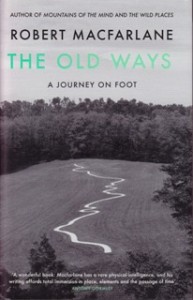 What a refreshing and stimulating view of the practice of walking, “as enabling sight and thought rather than encouraging retreat and escape; paths as offering not only means of traversing space, but also ways of feeling, being and knowing.”
What a refreshing and stimulating view of the practice of walking, “as enabling sight and thought rather than encouraging retreat and escape; paths as offering not only means of traversing space, but also ways of feeling, being and knowing.”
First suggested by our schoolteacher son, Robert Macfarlane’s mesmerizing and lyrical stories of his walks along the English Downs, sailing and hiking in Scotland, plus other walks in Palestine, Spain and Tibet are a paean to movement, observation, thought and imagination. As he says, “paths connect. This is their first duty and their chief reason for being.” They then become a “labyrinth of victory,” of personal freedom. “Walking is a means of personal myth-making.”
I agree completely!
Walking, especially solo treks, can restore serenity and sanity, curiosity and calm. Macfarlane’s words reminded me of my hiking England’s South Downs and its Way in 1978, during an autumn sabbatical in West Sussex, from Cocking and Graffham, where we were living for four months, around Bigham Hill and on to Arundel, where a pub and a pint rewarded my effort. I also recall with fondness my many treks on the “public footpaths” of England, on the “wanderwegs” of Germany and the Appenzell of Switzerland, around Sydney Harbor in Australia, the Milford Track in New Zealand and, closer to home, in the Nehantic State Forest of Lyme, Conn.
And his words pulled back into memory Jonathan Raban’s ‘Coasting,’ his story of sailing counterclockwise around the British Isles, and Paul Theroux’s ‘A Kingdom By The Sea,’ his clockwise walk around England, both in 1982 (the two travelers met by chance in a pub on their respective journeys and had little to say to each other!)
Macfarlane’s remarkable memory and descriptions of his travels become almost Joycean at times. Here is his sailing departure from Stornoway Harbor:
“ . . . hints of oil, hints of hooley. Sounds of boatslip, reek of diesel. Broad Boy’s (the boat he travelled on) wake through the harbor – a tugged line through the fuel slicks on the water’s surface, our keel slurring petrol-rainbows. Light quibbling on the swell . . . . Seals . . . their blubbery backs looking like the puffed-up anoraks of murder victims.”
Strangely, though, Macfarlane never mentions or quotes Baudelaire and his famous flaneur, another exponent of the joy of setting one foot in front of the other, without worry of time and course.
He concludes with a lovely Spanish palindrome: “La ruta nos aporto otro paso natural” (The path provides the next step.) The “old ways” are indeed “rights of way and rites of way.”
Editor’s Note: Robert Macfarlane’s ‘The Old Ways’ is published by Penguin Books, New York 2012.

About the author: Felix Kloman is a sailor, rower, husband, father, grandfather, retired management consultant and, above all, a curious reader and writer. He’s explored how we as human beings and organizations respond to ever-present uncertainty in two books, ‘Mumpsimus Revisited’ (2005) and ‘The Fantods of Risk’ (2008). A 20-year resident of Lyme, he now writes book reviews, mostly of non-fiction that explores our minds, our behavior, our politics and our history. But he does throw in a novel here and there. For more than 50 years, he’s put together the 17 syllables that comprise haiku, the traditional Japanese poetry, and now serves as the self-appointed “poet laureate” of Ashlawn Farms Coffee, where he may be seen on Friday mornings.
His wife, Ann, is also a writer, but of mystery novels, all of which begin in a bubbling village in midcoast Maine, strangely reminiscent of the town she and her husband visit every summer.